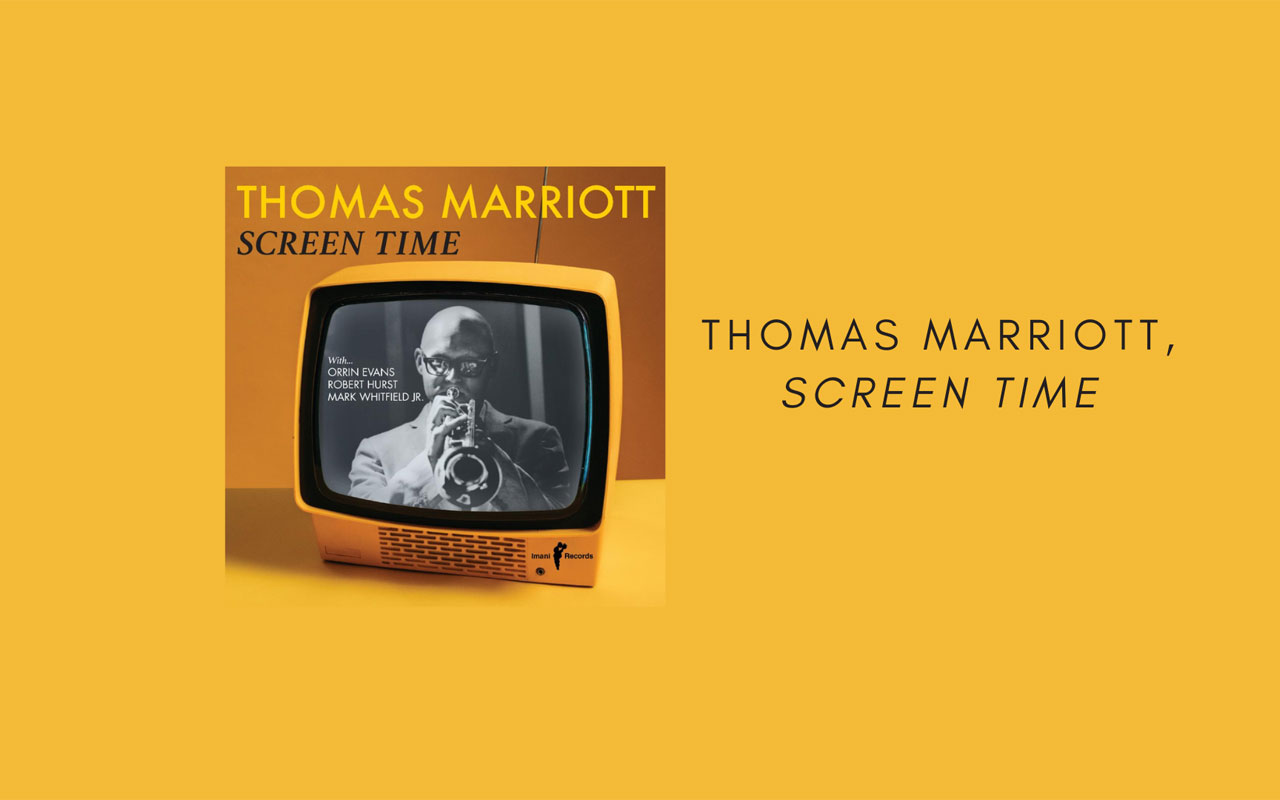
Imani Records, January 2025
Fans who’ve watched trumpeter Thomas Marriott – “Seattle’s busiest man” – around town this past year may have seen him with Free Fall, a quartet trekking determinedly down the musical path from which they take their name (free). So it seems an about-face that Marriott’s newest release, Screen Time, should retreat to the nostalgic, prim fields of classic American television and film.
Jazz being the medium that it is, “nostalgia” is a relative term (free jazz is nearly a septuagenarian enterprise). And Marriott being the musician that he is, these seven covers and two originals are accomplished in rhythms that would have their composers’ heads spinning.
This has to do with the makeup of Marriott’s quartet. Featuring longtime collaborator Orrin Evans on piano, Robert Hurst on bass, and the fantastic Mark Whitfield Jr. on drums, Screen Time is a groove-centric, wide-lens effort that explores nearly as many musical ideas as the cinematic genres from which it draws. It’s somewhat obvious that Fred Rogers’ “It’s Such a Good Feeling” (Rogers wrote his own music!) should come off lighter than “Goodbye” from Alan Silvestri’s 1987 Predator soundtrack. Hearing them played by the same quartet a few tracks apart is the treat, especially when the atmospheric sparseness of “Goodbye” collapses into 70s-sounding psychedelia à la Joe Henderson’s “Earth.”
Screen Time is a pleasant reminder that film and television composers, like their Tin Pan Alley precursors, have a splendid ear for chordal movement. On top of that, movie tunes are functional; they’re often based around motifs. Marriott bends these repeated melodies to his will and even invents his own on the thumping original “Skip Intro,” which could slot in after Dave Brubeck’s television hit “Theme from Mr. Broadway.”
The nine songs reach their exploratory peak with a mid-album trio: the aforementioned “Goodbye/Love Theme,” the prog-adjacent “Pinball Number Count” (featuring Shedrick Mitchell on organ), and the ruminative “Dexter’s Tune.” After the Hendersonian Predator conclusion, Marriott and co. take a trip down Sesame Street for “Pinball Number Count,” which sounds as if Bert and Ernie stumbled into Greenwich Village at 2:30am (the original sounds a bit like that, too). “Dexter’s Tune,” written by Randy Newman for Awakenings – a 1990 film based on Oliver Sacks’ stranger-than-fiction experience with sleeping sickness patients – is the album’s prettiest track. Whitfield takes up the brushes, Marriott a soft mute. Evans and Hurst have all the legroom in the world.
This leads nicely into the title track, a driving Marriott original, before the band dissembles the theme from Reading Rainbow, a tune that was surprisingly jazzy to begin with. That’s the fun here: past versus present. Speaking of which, the record title is a double entendre, “screen time” being a way we talk about today’s phone habits. Put down those devices and turn on the nearest stereo. Let Marriott turn back the clock.